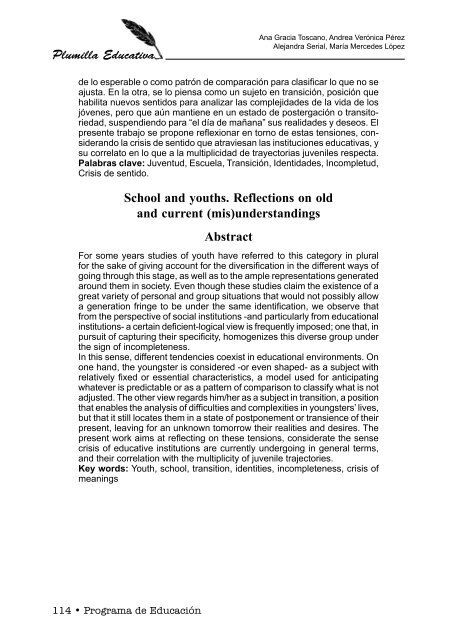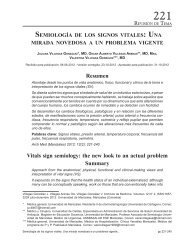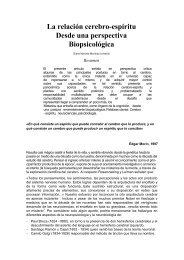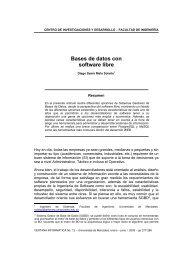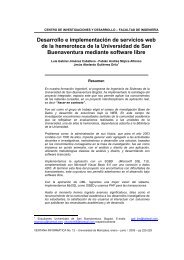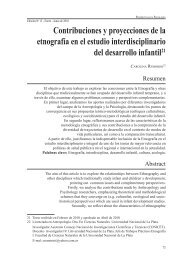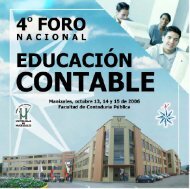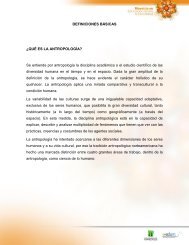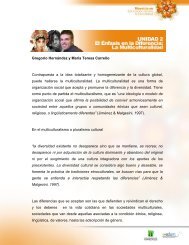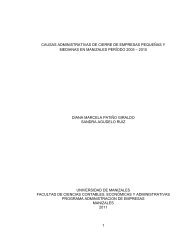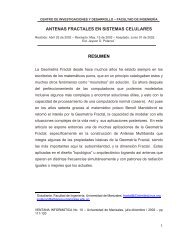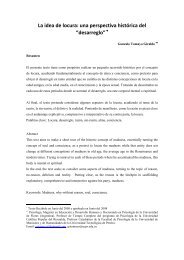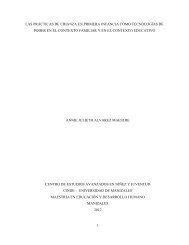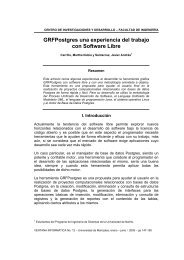- Page 2 and 3:
FACULTAD DE CIENCIAS SOCIALES Y HUM
- Page 4 and 5:
Plumilla EducativaEditorMiguel Albe
- Page 6:
Plumilla EducativaSumarioPáginaPre
- Page 9 and 10:
Plumilla EducativaLa voz del Decano
- Page 11 and 12:
Plumilla EducativaJerome Seymour Br
- Page 14 and 15:
What should psychology study, and w
- Page 16 and 17:
¿Qué se debe estudiar en Psicolog
- Page 18 and 19:
¿Qué se debe estudiar en Psicolog
- Page 20 and 21:
Los procesos educativos y la emerge
- Page 22 and 23:
Los procesos educativos y la emerge
- Page 24 and 25:
Los procesos educativos y la emerge
- Page 26 and 27:
Los procesos educativos y la emerge
- Page 28 and 29:
Los procesos educativos y la emerge
- Page 30 and 31:
Los procesos educativos y la emerge
- Page 32 and 33:
Los procesos educativos y la emerge
- Page 34 and 35:
Los procesos educativos y la emerge
- Page 36 and 37:
Los procesos educativos y la emerge
- Page 38 and 39:
Sueños multiculturales y pos-viole
- Page 40 and 41:
Sueños multiculturales y pos-viole
- Page 42 and 43:
Sueños multiculturales y pos-viole
- Page 44 and 45:
Sueños multiculturales y pos-viole
- Page 46 and 47:
Sueños multiculturales y pos-viole
- Page 48 and 49:
Sueños multiculturales y pos-viole
- Page 50 and 51:
Dadá y el valor artístico de la o
- Page 52 and 53:
Dadá y el valor artístico de la o
- Page 54 and 55:
Dadá y el valor artístico de la o
- Page 58:
Dadá y el valor artístico de la o
- Page 62 and 63:
Procesos generativos en el diálogo
- Page 64 and 65: Procesos generativos en el diálogo
- Page 66 and 67: Procesos generativos en el diálogo
- Page 68 and 69: Procesos generativos en el diálogo
- Page 70 and 71: Procesos generativos en el diálogo
- Page 72 and 73: Procesos generativos en el diálogo
- Page 74 and 75: Procesos generativos en el diálogo
- Page 76 and 77: Divagaciones educativas en torno a
- Page 78 and 79: Divagaciones educativas en torno a
- Page 80 and 81: Divagaciones educativas en torno a
- Page 82 and 83: Divagaciones educativas en torno a
- Page 84 and 85: Divagaciones educativas en torno a
- Page 86 and 87: Genealogía de la práctica pedagó
- Page 88 and 89: Genealogía de la práctica pedagó
- Page 90 and 91: Genealogía de la práctica pedagó
- Page 92 and 93: Genealogía de la práctica pedagó
- Page 94 and 95: Reflexiones y propuestas en torno a
- Page 96 and 97: Reflexiones y propuestas en torno a
- Page 98 and 99: Reflexiones y propuestas en torno a
- Page 100 and 101: Reflexiones y propuestas en torno a
- Page 102 and 103: Reflexiones y propuestas en torno a
- Page 104 and 105: De horizontes, utopías y distopía
- Page 106 and 107: De horizontes, utopías y distopía
- Page 108 and 109: De horizontes, utopías y distopía
- Page 110 and 111: De horizontes, utopías y distopía
- Page 112 and 113: De horizontes, utopías y distopía
- Page 116 and 117: Escuelas y juventudes. Reflexiones
- Page 118 and 119: Escuelas y juventudes. Reflexiones
- Page 120 and 121: Escuelas y juventudes. Reflexiones
- Page 122 and 123: Escuelas y juventudes. Reflexiones
- Page 124 and 125: Escuelas y juventudes. Reflexiones
- Page 126 and 127: Escuelas y juventudes. Reflexiones
- Page 128 and 129: Escuelas y juventudes. Reflexiones
- Page 130 and 131: La autorregulación de los herrores
- Page 132 and 133: La autorregulación de los herrores
- Page 134 and 135: La autorregulación de los herrores
- Page 136 and 137: La autorregulación de los herrores
- Page 138 and 139: La autorregulación de los herrores
- Page 140 and 141: La autorregulación de los herrores
- Page 142 and 143: La autorregulación de los herrores
- Page 144 and 145: La autorregulación de los herrores
- Page 146 and 147: Una doble calzada: la técnica cont
- Page 148 and 149: Una doble calzada: la técnica cont
- Page 150 and 151: Una doble calzada: la técnica cont
- Page 152 and 153: Una doble calzada: la técnica cont
- Page 154 and 155: Una doble calzada: la técnica cont
- Page 156 and 157: Una doble calzada: la técnica cont
- Page 158 and 159: Una doble calzada: la técnica cont
- Page 160 and 161: Patologías de la educación superi
- Page 162 and 163: Patologías de la educación superi
- Page 164 and 165:
Patologías de la educación superi
- Page 166 and 167:
Patologías de la educación superi
- Page 168 and 169:
Patologías de la educación superi
- Page 170 and 171:
Una evaluación diagnóstica del im
- Page 172 and 173:
Una evaluación diagnóstica del im
- Page 174 and 175:
Una evaluación diagnóstica del im
- Page 176 and 177:
Una evaluación diagnóstica del im
- Page 178 and 179:
Una evaluación diagnóstica del im
- Page 180 and 181:
Una evaluación diagnóstica del im
- Page 182 and 183:
Una evaluación diagnóstica del im
- Page 184 and 185:
Configuraciones de poder en educaci
- Page 186 and 187:
Configuraciones de poder en educaci
- Page 188 and 189:
Configuraciones de poder en educaci
- Page 190 and 191:
Configuraciones de poder en educaci
- Page 192 and 193:
Configuraciones de poder en educaci
- Page 194 and 195:
Implicaciones morales y emocionales
- Page 196 and 197:
Implicaciones morales y emocionales
- Page 198 and 199:
Implicaciones morales y emocionales
- Page 200 and 201:
Implicaciones morales y emocionales
- Page 202 and 203:
Implicaciones morales y emocionales
- Page 204 and 205:
La trama de hierro: ingenio tecnol
- Page 206 and 207:
La trama de hierro: ingenio tecnol
- Page 208 and 209:
La trama de hierro: ingenio tecnol
- Page 210 and 211:
La trama de hierro: ingenio tecnol
- Page 212 and 213:
La trama de hierro: ingenio tecnol
- Page 214 and 215:
La trama de hierro: ingenio tecnol
- Page 216 and 217:
La trama de hierro: ingenio tecnol
- Page 218 and 219:
Lenguajes de poder. Una mirada a la
- Page 220 and 221:
Lenguajes de poder. Una mirada a la
- Page 222 and 223:
Lenguajes de poder. Una mirada a la
- Page 224 and 225:
Lenguajes de poder. Una mirada a la
- Page 226 and 227:
Resiliencia, opera prima en la espe
- Page 228 and 229:
Resiliencia, opera prima en la espe
- Page 230 and 231:
Resiliencia, opera prima en la espe
- Page 232 and 233:
Resiliencia, opera prima en la espe
- Page 234 and 235:
Resiliencia, opera prima en la espe
- Page 236 and 237:
Resiliencia, opera prima en la espe
- Page 238 and 239:
Resiliencia, opera prima en la espe
- Page 240 and 241:
Currículo inclusivo. pp. 239-251Pl
- Page 242 and 243:
Currículo inclusivo. pp. 239-2511.
- Page 244 and 245:
Currículo inclusivo. pp. 239-251co
- Page 246 and 247:
Currículo inclusivo. pp. 239-251en
- Page 248 and 249:
Currículo inclusivo. pp. 239-251En
- Page 250 and 251:
Currículo inclusivo. pp. 239-2513.
- Page 252 and 253:
Currículo inclusivo. pp. 239-251el
- Page 254 and 255:
Mejoramiento de las capacidadescoor
- Page 256 and 257:
Mejoramiento de las capacidadescoor
- Page 258 and 259:
Mejoramiento de las capacidadescoor
- Page 260 and 261:
Mejoramiento de las capacidadescoor
- Page 262 and 263:
Mejoramiento de las capacidadescoor
- Page 264 and 265:
Mejoramiento de las capacidadescoor
- Page 266 and 267:
Mejoramiento de las capacidadescoor
- Page 268 and 269:
La educación ambiental. Mirada ret
- Page 270 and 271:
La educación ambiental. Mirada ret
- Page 272 and 273:
La educación ambiental. Mirada ret
- Page 274 and 275:
La educación ambiental. Mirada ret
- Page 276 and 277:
La educación ambiental. Mirada ret
- Page 278 and 279:
La educación ambiental. Mirada ret
- Page 280 and 281:
La educación ambiental. Mirada ret
- Page 282 and 283:
La educación ambiental. Mirada ret
- Page 284 and 285:
Concepciones de los maestros del In
- Page 286 and 287:
Concepciones de los maestros del In
- Page 288 and 289:
Concepciones de los maestros del In
- Page 290 and 291:
Concepciones de los maestros del In
- Page 292 and 293:
Concepciones de los maestros del In
- Page 294 and 295:
Concepciones de los maestros del In
- Page 296 and 297:
Concepciones de los maestros del In
- Page 298 and 299:
Plumilla EducativaRequisitos para p
- Page 300 and 301:
Plumilla Educativasemejante a los u


